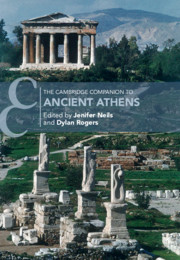Book contents
- The Cambridge Companion to Ancient Athens
- Cambridge Companions to the Ancient World
- The Cambridge Companion to Ancient Athens
- Copyright page
- Contents
- Contributors
- Abbreviations
- Athens: An Introduction
- 1 #Leagros: An Athenian Life
- Part I The Urban Fabric
- Part II Inhabitants
- Part III Business/Commerce
- 15 Labor and Employment
- 16 Piraeus: Harbors, Navy, and Shipping
- 17 The Archaeology of Markets and Trade
- 18 Coinage and Its Economic Implications
- 19 The Ceramic Industry
- 20 Sculpture and Its Role in the City
- Part IV Culture and Sport
- Part V Politics
- Reception
- Index
- References
18 - Coinage and Its Economic Implications
from Part III - Business/Commerce
Published online by Cambridge University Press: 10 March 2021
- The Cambridge Companion to Ancient Athens
- Cambridge Companions to the Ancient World
- The Cambridge Companion to Ancient Athens
- Copyright page
- Contents
- Contributors
- Abbreviations
- Athens: An Introduction
- 1 #Leagros: An Athenian Life
- Part I The Urban Fabric
- Part II Inhabitants
- Part III Business/Commerce
- 15 Labor and Employment
- 16 Piraeus: Harbors, Navy, and Shipping
- 17 The Archaeology of Markets and Trade
- 18 Coinage and Its Economic Implications
- 19 The Ceramic Industry
- 20 Sculpture and Its Role in the City
- Part IV Culture and Sport
- Part V Politics
- Reception
- Index
- References
Summary
Besides providing a brief illustrated account of Athens’ influential and widely disseminated Athena/owl silver coinage, this chapter surveys the huge silver mining and processing industry of southeast Attika, the role of coinage in the public and private economies of Athens and in international trade, and the minting of a bronze coinage for use at the Eleusinian festival.
- Type
- Chapter
- Information
- The Cambridge Companion to Ancient Athens , pp. 257 - 268Publisher: Cambridge University PressPrint publication year: 2021
References
Further Reading
For a broader and more detailed survey of Athenian coinage, consult Van Alfen 2012, which is excellent and fully up-to-date. For an exploration of what coinage can reveal about the history of fifth-century Athens, see Kallet and Kroll 2020. In addition to the discussions of Rihll 2001 and Hopper 1953, other informative accounts of Athens’ silver mining and processing industries will be found in Mee 2011 and Kakavoyannis 2005 (with an English summary, pp. 331–339). For the many aspects of the Athenian economy, there are illuminating treatments by Kallet 2007, Pritchard 2015, and throughout Bresson 2016.
Bibliography
- 1
- Cited by

